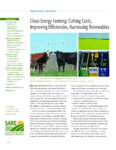The educational materials listed on this page are about Biodiesel.
What is biodiesel? Biodiesel is an alternative fuel created from plant and living matter that is converted to a usable energy source. Biodiesel fuel is used in standard diesel engines and is different from the vegetable and waste oils used in converted diesel engines. Biodiesel can be used alone, or blended with petrodiesel in any proportion for biodiesel production. Biodiesel feedstock can include agronomic crops, or other biomass from industrial or municipal wastes. Key practices include byproduct utilization, bioenergy and biofuels, anaerobic digestion, biodiesel, biofuel feedstocks, nutrient cycling, municipal wastes, renewable energy.
SARE’s book Building a Sustainable Business helps farmers build both a sustainable and profitable business plan that includes renewable energy and biofuel. The SARE bulletin Clean Energy Farming: Cutting Costs, Improving Efficiencies, Harnessing Renewables helps farmers utilize clean energy practices on their operations. These practices may include utilizing byproducts for biodiesel production and other renewable fuels. The Farm Energy Topic Room provides a wealth of information on clean energy topics, including biodiesel, farm energy audits, solar and wind energy, and more. For safety best practices in small-scale biodiesel production, see the Penn State publication Biodiesel Safety and Best Management Practices for Small-Scale Noncommercial Use and Production.
Showing 1-6 of 6 results

Sustainable Production and Use of On-Farm Energy
Using solar or wind energy or producing biofuels from crop feedstocks and anaerobic digestion helps farmers achieve energy independence while improving profitability and reducing fossil fuel emissions.

The Sustainability of Biofuel Fact Sheet Series
This 18-part series addresses topics related to the sustainability of biofuel production, including biodiversity, greenhouse gas reductions, life cycle analysis and more.

Energy Independence: On-Farm Biodiesel Fuel Production
Roger Rainville is ahead of the curve when it comes to reducing costs on his farm near Alburgh, Vt. He’s currently producing biodiesel from canola and sunflower for about $1.70 a gallon.
Storage Methods for Ethanol Co-Products
This University of Nebraska video series contains information on the storage and utilization of three unique co-product feeds from the ethanol industry.

Clean Energy Farming
Clean Energy Farming: Cutting Costs, Improving Efficiencies, Harnessing Renewables features innovative SARE-funded research and examples of farmers who are improving energy efficiency while saving money, implementing farming practices that both save energy and protect natural resources, and producing and using renewable fuels.

Biodiesel Safety and Best Management Practices for Small-Scale Noncommercial Use and Production
This publication reviews some of the accepted practices associated with small-scale biodiesel production to make it a safe, environmentally sound practice that generates a quality product.